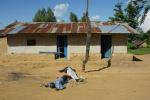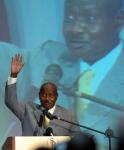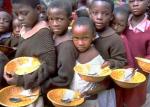Peoples' Media:
Dictator Museveni has since 1997 been involved in the systematic destabilisation of the Democratic Republic of Congo, and the resultant horrific civil war. This involvement continues to this day.As early as 1992 'The Guardian' reported that:

"In the six years since Yoweri Museveni took power, his government has managed to alienate three of its five neighbours. Relations remain good with only Tanzania and Congo DRC." Museveni sparked off Africa's most tragic humanitarian crisis when it subsequently sought to destabilise Congo DRC. In 1997, the London 'Times' reported that "Uganda ... backed an uprising by rebels in eastern Congo DRC who's aim was to drive the Zairean Army from the region and bring down President Mobutu"
In 2001, Human Rights Watch documented this involvement, stating that Museveni had "fuelled political and ethnic strife in eastern Congo with disastrous consequences for the local population."This had included stirring up ethnic violence, murdering civilians and "laying waste their villages."

Human Rights Watch had also previously noted that Uganda was responsible for the murder of large numbers of civilians in north- east Congo.This was also confirmed by Congolese human rights organisations.In late 2002, Uganda was subsequently again accused of deliberately seeking to "provoke ethnic conflict, as in the past" - actions which the United Nations warned risked genocide in the region. In July 2003, a Human Rights Watch report, '"Covered in Blood": Ethnically Targeted Violence', stated, for example, that Uganda was involved in the ethnically-motivated murder of several thousand Congolese civilians in the Ituri area of north-eastern Uganda. Uganda continues to arm Congolese gunmen responsible for horrific acts of terrorism - acts every bit as horrific as those attributed to the LRA in northern Uganda. The Museveni regime was also accused of militarily and logistically assisting the UNITA rebel movement in Angola.

Additionally, the UN has repeatedly stated that Uganda was criminally and systematically stealing Congo's resources. A Human Rights Watch report also noted that Ugandan forces "have blatantly exploited Congolese wealth for their own benefit and that of their superiors at home."
The hypocrisy of Museveni's public bleating about neighbouring states allegedly destabilising his government is clear.
The International Community's Responsibility for Continuing Conflict in Uganda.

The international community itself shares a partial responsibility for the continuing war in northern Uganda. This responsibility is at least two-fold. Western governments continue to project Uganda as a success story when the reality is that it is wracked by political turmoil and Uganda's economy is artificially buoyed by aid. A Refugees International report has observed, for example, that according to one estimate donors provide about 53 percent of Uganda's budget. They also cited a UN official as saying: "[D]onors don't want to portray Uganda as another African country that is going down the drain. Because they give so much to Uganda, donors have a political motivation to make sure that it is seen as a success story."

This pretence ignores, in addition to the conflict in northern Uganda, Museveni's responsibility for the deaths of millions of civilians in Congo. The international community, by facilitating a military rather than a peaceful solution, also bears a direct responsibility for prolonging conflict.
A UN news report, for example, has noted: "Some aid agencies working in the north have criticised the international community for allowing Museveni's government to keep the humanitarian crisis in the north on the back burner ... For example, they have expressed concern over the government's recent decision to re-allocate 23 percent of funds from other ministries to defence, seen by some as indicating a preference for a military solution over a peaceful settlement in the north."

We call upon all our friends around the world to publish the crimes of Yoweri Museveni and also educate their local communities about the african Polpot.



Comments
Museveni in Congo and Sudan:
The former commander of the Ugandan People's Defense Forces (UPDF), Gen. James Kazini, a nephew of Ugandan dictator Yoweri Museveni, was at the center of charges against the Ugandan army of wholesale looting in Uganda and southern Sudan. As EIR reported in its last issue (see pp. 58-65), Kazini was also caught in a covert caper to smuggle arms to the Sudanese People's Liberation Army of John Garang, operating in cahoots with Roger Winter of the U.S. Committee on Refugees, Daniel Eiffe of Norwegian Peoples Aid, and notorious gun-smugglers Michael Harari, formerly Israeli Mossad station chief for South America, and Alberto P. Herreros, formerly a prime contract for the illegal George Bush-Oliver North Contra supply operation of the 1980s.
The question now being raised is whether the covert supply of arms was being paid for by booty gathered by the Ugandan Armed Forces, which invaded the Democratic Republic of Congo on Aug. 2, and followed that with an invasion of Sudan in September. According to some sources, the money gained from the sale of the gold, timber, and diamonds, being looted out of Congo and southern Sudan, was put into offshore bank accounts, and then used to buy the arms and other supplies to keep the wars going.
According to a South African intelligence source, Kazini was in command of the invasion of the Congo, the source having accompanied him during the campaign in western Congo, which failed. Kazini's presence in Congo is not just military, but is also for business-a fact that came to light when Kazini's brother, Col. Jet Mwebaze, was killedin a crash on Sept. 26 of a private plane, apparently on its way to the Congo. Soon after the rescue of some of the survivors of the crash, news began to leak out that pointed to far more than a technical failure or weather problems:
The pilot of the plane was found with a bullet in his head.
Colonel Mwebaze was reportedly also shot before or after the plane crashed.
More than $1 million in cash was found on the plane.
Other passengers on the plane included Asian businessman Arif Mulfi and Israeli businessman Zeev Shif, a partner in the Eforte Corp., a company of Salim Saleh, half-brother to Dictator Museveni and Museveni’s top military adviser.
Speculation was rife throughout Uganda that the plane was going to the Congo for a pick-up of gold in areas under the occupation of Ugandan troops.
Corroboration of this idea soon came from an unexpected source: an article appearing in the Oct. 12 issue of New Times, the semi-official newspaper of the Rwandan government, a military satellite of Museveni's Uganda. The paper reported a "growing rift” between the Rwandan and Ugandan forces now occupying eastern portions of the Democratic Republic of the Congo, blaming the tensions on a "clique" in the UPDF centered on Kazini and Salim Sateh. Titled "Saleh Reducing the UPDF to a Thieving Gang," the article said, "When the war against [Congo President Laurent] Kabila broke out in the Congo, this clique saw it as a windfall-literally as a goldmine . . .. The clique now wreaking havoc in the Congo includes Maj. Gen. Salim Saleh, Brigadier Kazini, Colonel Kerim, Major Ikondere, and the late Lt. Col. Jet Mwebaze. The list reads like a who's who of the UPDF's top convicts."
The article charged, "A brave and personable officer, Colonel Mwebaze died on a gold mission in the company of elements of a murky international gold- and money-laundering syndicate, heading for the part of the Congo under the control of his own brother, Brigadier Kazini, in the service of General Salim Saleh, the overall warlord." The article was written by a Rwandan veteran of both the Rwandan Patriotic Army and Museveni's National Resistance Army.
The article further excoriated Salim Saleh for his involvement in privatization in Uganda, saying that he took a $1.5- million commission on a recent purchase of defective army helicopters.
The paper prompted a visit to Kigali, Rwanda from Salim Saleh, and a trip to Kampala, Uganda to meet Museveni by Rwandan Defense Minister Paul Kagame.
Salim Sateh admitted to the press that he was retrieving business operations lost with Kabila: "I used to have business with Kabila, but that is now lost," Salim told New Vision. He also said that the Israeli businessman on Jet's plane was in the gold business for him. He also attacked the Rwandans for "washing the dirty linen in public," but said that the rift had been heated. "We have now established a new code of conduct for smooth running of our operations."
Salim Saleh has also come under scrutiny from the Ugandan Parliament for allegations that he is the hidden buyer of the Ugandan Commercial Bank, which is being privatized by the government.
Before taking charge of the invasion of the Congo, Brigadier Kazini was commander of the fourth division of the UPDF, and in charge of operations in the north against the rebel Lord's Resistance Army and in support of the Sudanese 56.
As the mystery surrounding Mwebeze's death was still swirling around, an article appeared in the Ugandan opposition newspaper, which quoted an unnamed official of the SPLA complaining that Jet had also been in charge of a company that was fleecing southern Sudan of its resources of gold and timber. "Jet was the managing director of the New Sudan Trading Corporation (NSTC), which was the company formed by the SPLA to help in facilitating trade in areas under its control," the SPLA official said. He charged that the company was in fact dominated by Ugandan army officers, government ministers, and businessmen. The SPLA official said that in return for their share in the company, the Ugandan government permitted the SPLA to have free rein in northern Uganda to recruit guerrillas and to conduct private businesses, especially trade in cattle.
The looting of southern Sudan and eastern Congo by the Ugandan military clique led by Museveni proceeds despite the fact that Uganda is being aided by outside sources as well. In hearings on July 29, U.S. Assistant Secretary of State Susan Rice, an enthusiastic supporter of Museveni, reported that the United States provided Uganda with $3.85 million in military equipment last year, and will likely do so again in 1998, in addition to an International Military Education and Training Program. Under questioning, she admitted that the Ugandan military had "a lot of problems" of corruption and lack of discipline, which the government is not dealing with successfully.
The privatized looting is also evidently required despite a 26% increase in the Ugandan military budget announced for the 1998-99 budget by Minister of Finance, Planning, and Economic Development Gerald Sendaula-an increase which has caused protest among parliamentarians who represent Uganda's service-starved people. But Museveni was defended in this action by no less than the World Bank representative in Kampala, Randolph Harris, who proclaimed that the "security threats" to Uganda cannot be ignored.
Money to feed the war effort continues to roll in. The International Monetary Fund announced on Nov. 11 that it will hand over a $46 million loan to support Uganda's 1998-99 "economic program."
It is the conjecture of Ugandans that most of this money, including a recent grant from the British government of ₤67 million, will be siphoned off to pay for Museveni's military operations in the region, wars which the Ugandan people do not support.
An additional question is: How much of a slice do Museveni and his relatives, including Salim Saleh, Kazini, and others who now dominate the Ugandan Armed Forces, get from the booty-grabbing and other money flows? No matter what the size of the slice, however, the British Commonwealth extraction companies that follow in the wake of the military triumphs of Museveni's mercenary army, will take the biggest share of all.
Saleh’s wife sued
Tuesday, 15 February 2005
A religious organization, Uganda Brothers Christian Instruction and two others have filed a suit against Jovia Saleh seeking cancellation of a land title.
The plaintiffs through Bamwite Kakubo and Company advocates allege that Akandwanaho wife to Major General Salim Saleh fraudulently obtained the land title “ Nabigirwa Swamp”.
They allege that they are the rightful owners of the land, which they purchased from one Petro Lukonge in 1976.
The group says they had developed the land by growing crops as well as construction of buildings for their residence.
They allege that Jovia came with a fake land title and started construction of a building after destroying their crops.
They pray court to restrain her from taking over the land as well as stopping her construction.